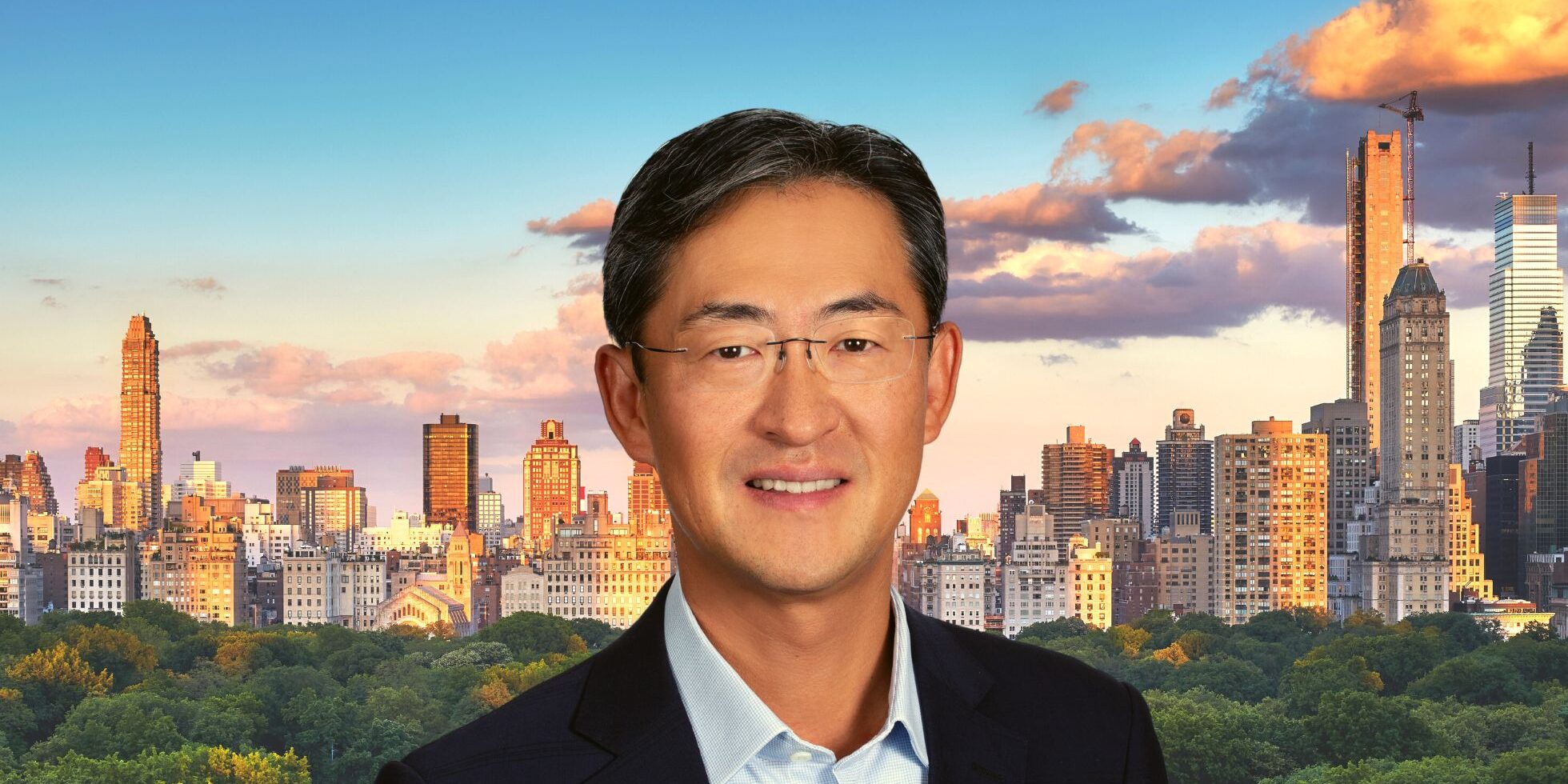The line of young Asian Americans who owe their Wall Street jobs to Mike Joo’s mentorship could wrap around a city block. Last year, KED Global reported that Mike Joo was the highest ranking Korean American banker on Wall Street, and over the years, he has quietly earned a reputation as a godfather figure for young Korean American bankers.
Born in Daegu, Korea, and raised in Minnesota, Mike is currently the COO for Global Corporate & Investment Banking at Bank of America Securities and was also named Head of North America last year. Fifteen years ago, he co-founded the Korea Finance Society (KFS) to help advance the careers of Asian American professionals in finance. To date, KFS has helped place hundreds of college students into jobs and internships in finance, and their last symposium drew 1,500 attendees.
Investment banking is notorious for being one of the most attractive but toughest industries to break into, especially for children of immigrants who don’t have the network or the know-how to get a foot in the door. Mike Joo and his cohorts at KFS have made it their mission to help level the playing field.
So how did a kid from Minnesota, who grew up more interested in fishing than studying, position himself to be able to help so many people? The answer might lie precisely in those small-town roots.
Mike immigrated to the US at the age of seven and grew up as the eldest son of a university professor. The Joos lived in a small, mostly white working-class suburb of Minneapolis. They attended a Korean church, and his parents opened their home to a steady stream of newcomers and visitors from Korea. Mike learned early on how to make people feel welcome, and he is remembered in Minnesota as the kid who was friends with everyone.
As a freshman at MIT, Mike found himself completely unsuited for the pre-med track his parents wanted him to pursue. He graduated with a degree in Biology but instead of medical school, he headed to Wall Street to work at Goldman Sachs.
Although he didn’t realize it at the time, his science background, penchant for hard work, and his abundantly social disposition made for an excellent recipe for success as a banker and a leader.
Here is our exclusive interview with Mike Joo.
~~~~~~~~~~~~~~~~~~~~~~~~~~~~~~
PL: What’s your go-to cocktail?
MJ: I like anything that is fruity and sweet, something like a midori sour, aperol spritz, etc. If you go to Oiji Mi in New York, there is a drink called The Last Banana Stand. It is absolutely fantastic.
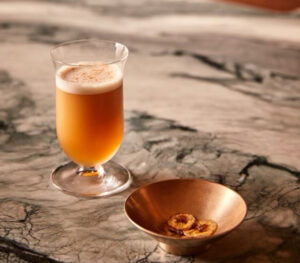
The Last Banana Stand at Oiji Mi, NYC.
Describe your perfect summer vacation.
Going fishing in Minnesota, Ontario, or Alaska. I also love golf and nice beaches. Actually, I just love playing with my kids, so anywhere we can spend time as a family is a perfect summer vacation. We went to Vietnam last summer and absolutely loved it. We especially enjoyed a motorcycle tour in Hanoi where we visited five different casual restaurants for different bites throughout the evening.
What is your favorite Korean comfort food?
Shin ramyun. But the key is to put in two eggs and really mix it around so it is all throughout the soup base. Very important!
What is the best gift you’ve gotten in recent memory?
When my grandmother passed away earlier this year, the elderly center she attended created a book of pictures of her from the center. She was very influential in my life, and I always admired her positive impact on others.
What do you like to splurge on and what are you most frugal about?
I splurge on food and I am very frugal about clothing. My wife has tried many times to retire some of my Banana Republic collection, but I am still holding on. Don’t forget, I was born in Daegu, grew up in Gyeongju and lived in a suburb of Minneapolis, ie, I am just a “chon-nom” and as such, I like to keep it simple!
What books have influenced you the most and why?
I always liked a good underdog story. When I was a kid, all I read were books about sports, especially stories about athletes who overcame adversity through perseverance. I remember a book about the pitcher Tommy John and how he came back from a really tough injury. He pioneered a procedure now called Tommy John Surgery.
What’s your favorite method to relax and recharge your batteries?
I grew up playing tennis so hitting tennis balls as hard as I can lets me de-stress and recharge. I’ve recently also really gotten into the sport of fencing, specifically foil, because of my daughters. I absolutely love fencing now.
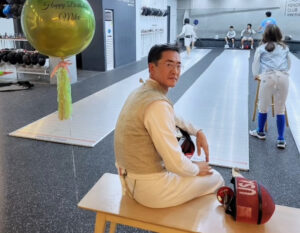
A recent photo of Mike Joo fencing with his daughters on his birthday.
My family recently forced me to enter a tournament and I resisted as I am just a beginner, but my daughters simply said, “Well Dad, you always tell us to embrace challenges…” I was so afraid of coming in last place, but actually did reasonably well and even won the second tournament I entered a few weeks ago!
What’s your favorite Korean drama or movie?
Sadly, I’m too busy with work to watch TV, but a friend of mine asked me to help sponsor a few private screenings of a movie called “Parasite”. I had no idea what the movie was even about, and who would have known that it would win the Oscar for Best Picture!
I also watched a movie called “Default”, which was about the negotiations with the IMF that took place during the Korean financial crisis in 1997. One of my most memorable projects was helping to advise the Korean government during the financial crisis when we led the inaugural bond offering for the country. The movie was so vivid, and it was really fun reliving the experience!
You spent a lot of time during the pandemic in Korea. What did you like most about it?
Seoul is a very busy place and on any given day there are so many things to do for our family ranging from hagwons, fencing practices, K-pop dance lessons, etc. And of course, the food is amazing.
The absolute best experience for us during the pandemic was that my kids attended a local public school in Seoul. Not an international school but a true ‘dongnae’ school. This really immersed them and tremendously improved their Korean. They absolutely loved it. The other kids were very welcoming and they made so many new friends. Our oldest daughter was even elected class president!
What are your favorite restaurants and hangouts in Korea?
SNY is a steak omakase restaurant in Gangnam that is just phenomenal. Sarang Bulgogi in Gangbuk is where I went the most to have a great dinner with friends. I also love jjamppong and jjajangmyeon in Korea, whether it’s a hole-in-the-wall or the Shilla Hotel. Great Korean Chinese is the one thing you still can’t really get in the US.
What are your favorite Korean restaurants in NYC?
There are so many, but Cote is my go-to. I also love The Kunjip for homestyle Korean food.
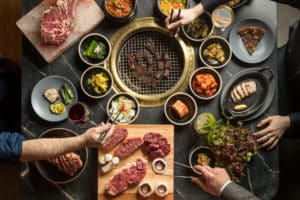
Cote Korean Steakhouse, NYC.
What is the most Korean thing about you?
Jeong. I’m a huge believer in jeong. Once you have jeong for someone, you never let that go. Even when people do things that you don’t like, if you have jeong for that person, you don’t turn your back on them. I don’t think there’s an exact English translation for jeong but there’s a Korean saying that the scariest thing in the world is jeong. That’s how powerful it is.
If you didn’t become a banker, what other career path would you have chosen?
I failed to become a doctor. My parents wanted me to become a doctor and I was pre-med in college, but I couldn’t stand blood and knew I couldn’t go to med school. If I hadn’t pursued banking, I would have certainly picked something in the business world.
What is the one trait that has contributed most to your professional success?
Constant hard work. My dad used to always tell me to get to the office one hour before everyone and leave one hour after. I am not a morning person, so I get to the office 15 minutes before but have always left much later than I’d like.
Banking is a tough business with lots of sharp elbows. Where did you get your toughness?
Actually, I was told that’s my biggest weakness in banking. Perhaps I’m not tough enough. One of my mentors used to constantly criticize me that I need to stop being too nice. He always said, “Mike, you’re now in the major leagues, you can’t just be Mr. Nice Guy.” That said, I think you can still be successful being the nice guy.
Growing up in Minnesota what kind of future did you see for yourself?
I just wanted to go fishing all the time. Did you know that Minnesota is the land of 10,000 lakes, but actually has more like 20,000 lakes? I think it taught me patience because we often didn’t catch many fish – actually, we often got skunked. My kids are sick and tired of me telling fishing stories. They always say, “Dad, I know, I know. Fishing teaches us to be patient.”
What was a pivotal turning point in your career?
I got married and my wise wife became the boss which set me on the right path. I did what she told me to do which turned out to be all the right things including coming back to the US after working in Hong Kong/Korea for eight years. I am very, very lucky to be with her.
In the finance world, do you see any differences between young Asian Americans and non-Asians?
Asian Americans need to do a better job of networking and forming a community with their colleagues. They rely too much on putting their heads down and “building the model”. Networking is not an easy job and you have to work at it. For me, I always just loved people. I never thought about it as networking, but just another opportunity to meet and spend time with more good people.
What advice would you give your 25-year-old self?
When I was 25, I liked everything. I especially liked buffet restaurants because you could eat a little bit of everything. So, the mistake I made was I wanted to learn about and try everything. It was helpful in many ways, but it would have been better if I focused on a couple of things and went much deeper at them. In fact, that’s what my father used to tell me all the time.
I’d also tell myself to take some more risks. I’m a bit risk averse. I need to take more chances like I did with fencing!
Are you an obsessive person and if so what are your obsessions?
As I have gotten older, I have learned to let things go and not get overly obsessed with anything, likely because I’m an obsessed Minnesota sports fan.
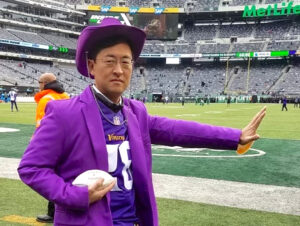
Mike Joo cheering for his Vikings at MetLife Stadium in Rutherford NJ.
I love all the Minnesota sports teams, especially the Vikings and the Twins. I get very emotional during games. Being a Minnesota sports fan has really taught me patience, endurance and perseverance, because every Minnesota sports team loses constantly. To make it worse, they have quality talent on the teams so you always hold on to the hope that they’ll win.
I’ve also adopted the Buffalo Bills as another team to cheer for as I’ve had the opportunity to become friends with people in the organization. Ironically, they too have lost four Super Bowls, so Vikings fans have that bond with Bills fans.
What important lessons did you learn from your parents?
We lived in Minnesota with a small community of Koreans, and we had so many people who moved there over the years and also many people who visited. My parents were so welcoming of guests. They always went out of their way to be hospitable. They just wanted to help. You see that growing up and you want to emulate that. My parents instilled in me a desire to simply help where we could. And in many ways, that’s what Korea Finance Society is all about – simply lending a hand to help each other.
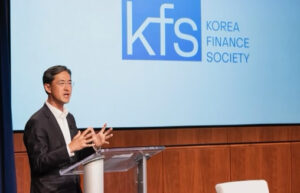
Mike Joo speaking at the KFS National Symposium.
What mistake taught you the biggest lesson?
I’ve been involved in a lot of food-related ventures, from restaurants that have won Michelin Stars to frozen yogurt. Early on, we had a lot of failures. Those failures taught me a lot about business. One of the most important things I learned is that it’s all about people. Even if something isn’t the best idea, the right people can adapt to make it better. And by the way, you want to work with good people anyway.
What do you think are the greatest challenges facing Korean Americans today?
I think there is significant momentum in our community. I think the challenge now is how to leverage that momentum and bring people together from different industries and variety of backgrounds to take it to the next level. We can’t let the momentum stop.
I don’t think we can succeed if it’s done in verticals. We need to connect and work together to achieve collective success. And again, it starts with simply helping each other out.
It’s a cultural mind shift, and people have to want to do it. You create a community, build a community, develop the community and then everyone wants to give back to the community. The more you provide structure and guidance and bring people together to nurture the community, the more naturally it becomes a flywheel.
Through KFS and mentoring, you are certainly doing your part to turn the flywheel. How do you encourage other people to do it?
The key to encouraging other people isn’t to tell them, it’s to show them. My job is to connect people, bring them together, and let them see for themselves.
People are busy, but when they see it, they want to be involved. We want to create a community where people want to help each other, which makes the community better. And we are strong as a community – not just as individuals.
Our goal at KFS is to create a flywheel for all Korean Americans everywhere. Finance is just one of the verticals, but we want all the verticals to touch each other and the more they touch, the more they start to become horizontals. We also want to provide inspiration and motivation to the younger generation and to showcase the success of Korean Americans in every field.
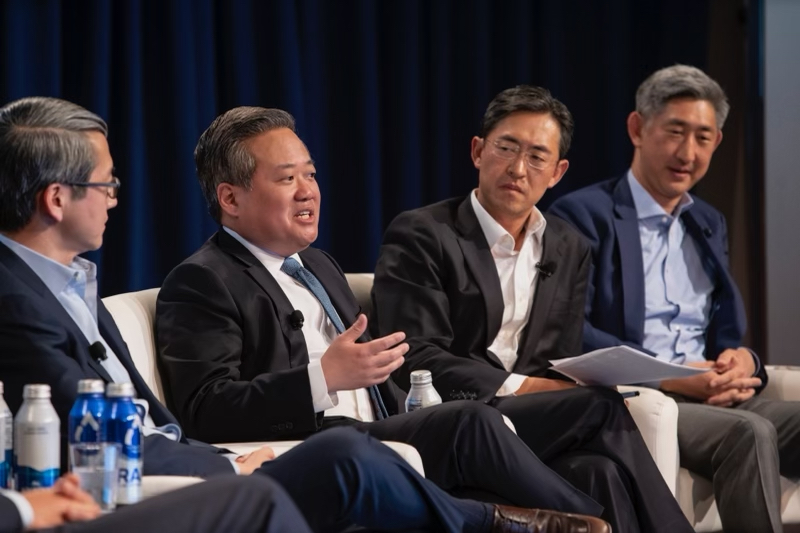
KFS National Symposium 2023: Mike Joo moderating a session with Young Lee, Co-President of Audax Private Equity, and Sandor Hau, Partner at Charlesbank and Co-Founder of KFS.
What advice would you give young Korean Americans deciding on a career path today?
It’s as simple as doing what you want to do. It’s a bit cliché, but it’s true because in ten years, or even five years, we have no idea which industries will be booming and what the world will even look like. So, you’re better off, simply doing something you enjoy.
People ask why I’ve been in banking for so long. It’s simple. The real reason is that I don’t know anything else. But I really do enjoy it. My job is fun because I get to meet and work with so many smart and interesting people and learn about so many different businesses. It goes back to liking what you’re doing and who you’re doing it with.

